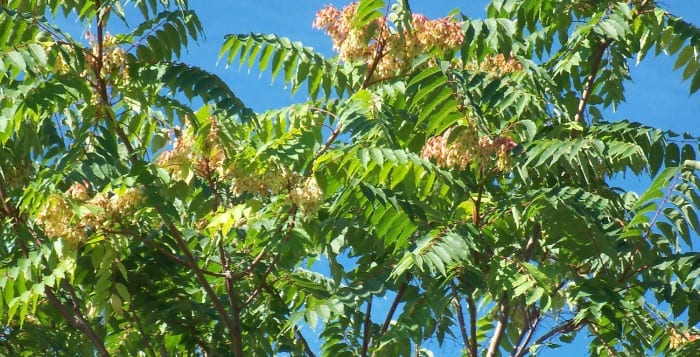By Ellen Barcel
Many years ago, my father pointed out some wild trees to me. He called them “stinkweed” trees, he said because close up, they smelled bad. Yes, they were wild — a weed and very hardy.
I hadn’t seen them in years, possibly because home gardeners generally don’t plant them and oak and pine are the native species most commonly found growing on Long Island. Recently, I came across a number of trees growing wild, which, to me, resembled the stinkweed trees from when I was a kid. Doing a bit of research, I discovered that yes, the trees I saw were indeed stinkweed trees. They were, in fact, Ailanthus altissima, also known as the tree of heaven.
A native of China, the tree’s Chinese name — chouchun — literally means “foul smelling tree,” i.e., stinkweed tree. Due to its many negative characteristics, some people refer to it as the “tree of hell,” rather than tree of heaven. Parts of the tree feature in traditional Chinese medicine as an astringent and as a food for silkworms so it has been grown there extensively.
The tree was first brought to Europe and then the United States in the late 1700s. The tree is now seen as an undesirable here for several reasons. One is that it produces suckers, meaning that it can easily spread, especially in disturbed areas. Another is its bad smell. It also appears to be able to suppress some competition by producing a chemical, ailanthone, that prevents other plants from growing in the area. This is known as allelopathy. Probably the best known allelopathic tree is the black walnut, but sunflowers seem to have the same ability.
The “tree” in the Betty Smith novel, “A Tree Grows in Brooklyn,” was the tree of heaven, found growing wild in New York City lots — yes that weed. The tree is hardy and in the book becomes a metaphor for a young girl’s family that survives adversity.
Since the tree is a rapid grower, it can force out native plants. It grows under a wide range of unfavorable conditions including poor soil and pollution. This opportunistic plant does well in disturbed areas (the way poison ivy does). It needs full sun and spreads by both seeds and root sprouts. Part of the reason it does so well is the fact that it has a tap root and we know what that means — in drought conditions it survives because the root goes way down into deeper levels of soil that still contain moisture. The Nature Conservancy suggests that seedlings be pulled out should you find them in your garden.
The Pennsylvania State Department of Conservation and Natural Resources’ website notes that there are “hundreds of thousands of seeds per tree … and a cut or injured ailanthus tree may send up dozens of root suckers and resprouts, creating large clonal colonies.”
Ailanthus altissima is on Suffolk County’s Management list, meaning it is considered invasive here, and it is recommended that the tree not be planted, especially near public land, although it is legal to do so. A rapid grower, it can easily reach close to 50 feet tall or more.
Incidentally, the tree of heaven is not the only tree with really foul smelling parts. The fruit of the ginkgo does as well. Most nurseries only sell male ginkgo trees, which do not produce fruit, hence no bad smell.
Ellen Barcel is a freelance writer and master gardener. Send your gardening questions and/or comments to [email protected]. To reach Cornell Cooperative Extension and its Master Gardener program, call 631-727-7850.






